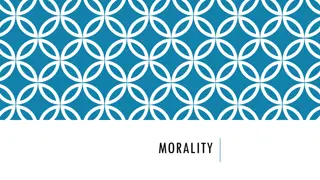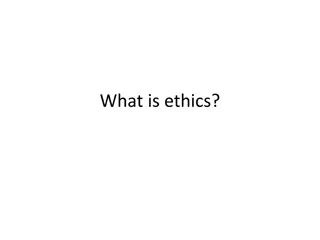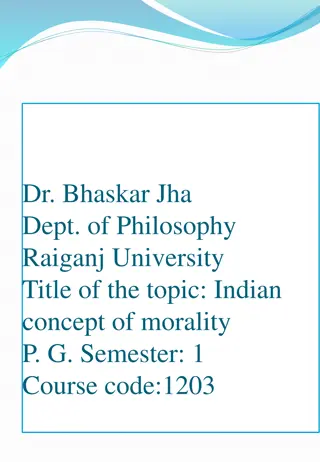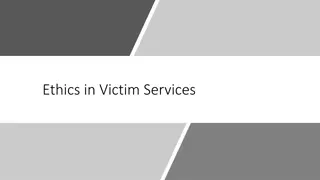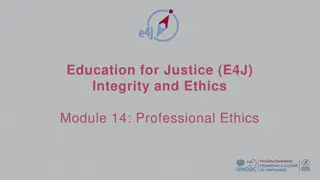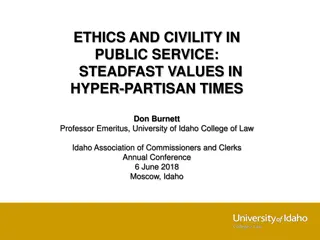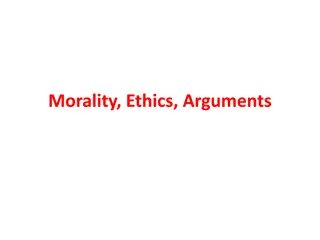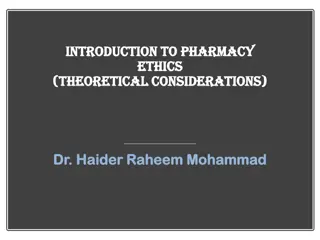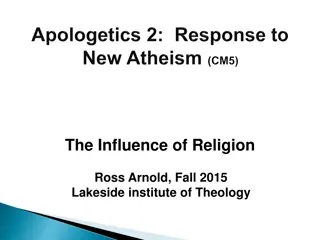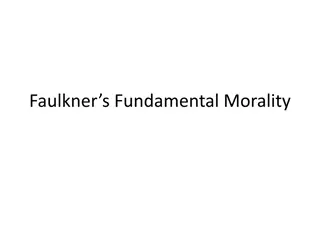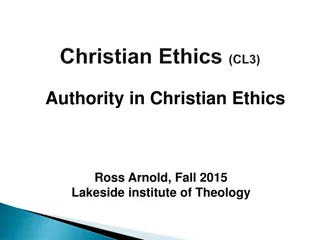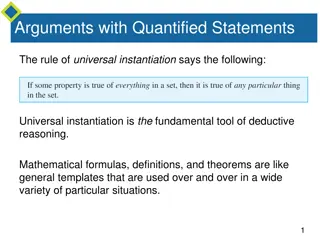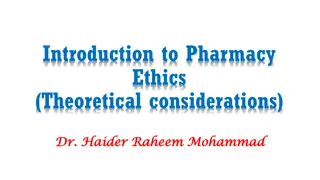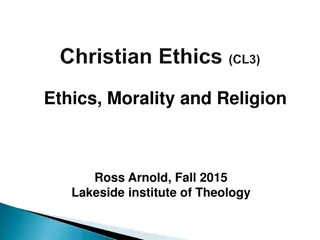Understanding Ethics, Values, and Universal Morality
Explore the concepts of ethics, universal values, and morality in a multicultural context through Education for Justice (E4J) Integrity and Ethics Module 2. Delve into topics such as the Universal Declaration on Human Rights, enacting universal values, moral relativism, and more. Gain insights on the relationship between theory and practice in formulating values and understand the role of deliberation in shaping values into actionable documents.
Download Presentation

Please find below an Image/Link to download the presentation.
The content on the website is provided AS IS for your information and personal use only. It may not be sold, licensed, or shared on other websites without obtaining consent from the author. Download presentation by click this link. If you encounter any issues during the download, it is possible that the publisher has removed the file from their server.
E N D
Presentation Transcript
Education for Justice (E4J) Integrity and Ethics Module 2: Ethics and Universal Values
Agenda Universal Values: Definitions (45 minutes) Universal Declaration on Human Rights (UDHR) (45 minutes) Enacting universal values (45 minutes) Universal Declaration of Human Values (45 minutes) Summary (10 minutes)
Learning Outcomes Upon completion of this module students should be able to: Understand the ideas of values, ethics, and morality in a multicultural context Understand how universal values can be uncovered by different means, including scientific investigation, historical research, or public debate and deliberation Understand and discuss the idea of moral relativism and the challenges it poses to universal values
Learning Outcomes II Upon completion of this module students should be able to: Critically assess the relationship between theory and practice in the formulation of values Understand that values arise from lived experiences, but need to be justified to others Understand the role of deliberation and debate in framing such values Understand how to create an actionable document through such a process
Universal Values: Definitions What is a universal value? What is a value? What is it to say that a value is universal? How do values relate to ethics and morality? Are there any universal values?
Universal Values: Definitions Valuing things is based on human needs Valuing behaviours arises from things we value But more than one behaviour can attain an end For example, I value peace as a state of being Behaviour 1: I will not harm others Behaviour 2: I will build up my defences so as not to be harmed Which will achieve what I value better?
Universal Values: Definitions What does Universal mean? Universal = all human beings Universal = all cultures Universal = all religions Universal = all legal and political systems
Universal Values: Definitions Universal values as behaviours Do not harm others Do not cheat others Do not lie to others Do not enslave others Universal values as things Peace Justice Equality Freedom Beauty Joy
Universal Declaration on Human Rights (UDHR) Proposed by UN General Assembly 1946 Economic and Social Council tasks Commission on Human Rights to formulate declaration Commission creates committee of 8 members to draft document, chaired by Eleanor Roosevelt UNESCO solicits views from international scholars Adopted by the UN General Assembly December 1948
Universal Declaration on Human Rights (UDHR) It is related that at one of the meetings of a UNESCO National Commission where Human Rights were being discussed, someone expressed astonishment that certain champions of violently opposed ideologies had agreed on a list of those rights. Yes, they said, we agree about the rights, but on condition that no one asks us why. That why is where the argument begins. Introduction Human Rights: Comments and Interpretations Jacques Maritain, (UNESCO, 1948)
Universal Declaration on Human Rights (UDHR) Rights without foundations? Rights or duties? Universal or lowest common denominator?
Enacting universal values (exercise) E1: Performance Team 1 PEACE Team 2 FREEDOM Team 3 SOCIAL PROGRESS TEAM 4 EQUAL RIGHTS TEAM 5 HUMAN DIGNITY
Universal Declaration of Human Values (exercise) E2: Creating a Universal Declaration of Human Values What do you value? How can what you value be turned into a rule of behaviour? What areas of life are most important to delimit in such a document, i.e., politics, law, economics, society, family, etc.?
Core reading The following entries in the Stanford Encyclopedia of Philosophy: Universal Declaration on Human Rights: o Universal Declaration of Human Rights http://www.un.org/en/universal-declaration-human- rights/index.html. UNESCO. Human rights: comments and interpretations: http://unesdoc.unesco.org/images/0015/001550/155042 eb.pdf. Brown, Gordon, ed. (2016). The Universal Declaration of Human Rights in the 21st Century. Open Book Publishers. Annan, Kofi. Speech on Universal Values: https://www.un.org/press/en/2003/sgsm9076.doc.htm Parliament of World Religions. Declaration toward a Global Ethic: https://parliamentofreligions.org/pwr_resources/_include s/FCKcontent/File/TowardsAGlobalEthic.pdf o The Definition of Morality (https://plato.stanford.edu/entries/morality-definition/) Moral Particularism and Moral Generalism (https://plato.stanford.edu/entries/moral-particularism- generalism/) Aristotle (https://plato.stanford.edu/entries/aristotle/) Mencius (https://plato.stanford.edu/entries/mencius/) Habermas (https://plato.stanford.edu/entries/habermas/) o o o o o o o o The Carnegie Council for Ethics in International Affairs: o Norms, Morals and Ethics (https://www.carnegiecouncil.org/education/002/normsm oralsethics) o Global Ethics Corner (https://www.carnegiecouncil.org/education/008/GEC)




